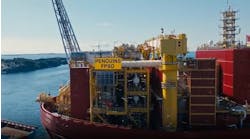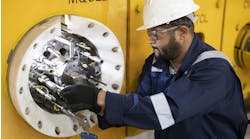OGA issues grants for North Sea electrification studies
Offshore staff
LONDON – Britain’s Oil and Gas Authority (OGA) has awarded three companies equal shares of a £1-million ($1.325 million) prize for ideas to help electrify platforms in the UK North Sea.
The OGA devised its decarbonization competition with the UK’s Department of Business, Energy and Industrial Strategy, the aim being to fund technical and commercial studies for offshore electrification as part of the North Sea Transition Deal.
All three winners must now complete their studies by March 31, 2022, with project reports to be published during 2Q.
Orcadian Energy is the project lead for “Innovative concepts for the electrification of offshore installations in the Central Graben.”
The London-based E&P company, operator of the proposed Pilot heavy oilfield polymer project on the Western Platform of the UK central North Sea, plans to use renewable energy, supplied from local wind farms, for much of the electricity required, with back-up power generated from gas or net zero fuels, supported by batteries.
Crondall Energy (client engineer), Enertechnos (cable technology), Petrofac (EPC and O&M contractor), North Sea Midstream Partners (infrastructure investor), and Wärtsilä (power system supplier) are supporting the study.
Ørsted is project lead for “Addressing technical and commercial requirements of windfarm connections with offshore installations.”
The company plans to use the lease area around its Hornsea offshore wind farm in the UK southern North Sea, which started operations earlier this week, and an existing gas platform, to investigate the optimal technical design for a stable and reliable power supply from an offshore wind farm.
The four-month feasibility study will also assess commercial solutions for establishing an electrical connection between an offshore wind farm and other installations. Ørsted’s goal is a solution that could be scaled, replicated, and applied to any wind farm and platform close to each other: its partners in the project are Neptune Energy and Goal7.
Aberdeen-based Katoni Engineering is leading the study “An optimised interface for distributed offshore renewable sources supplying existing offshore installations with secure and low-emissions power.”
This will assess how different sources and locations of renewable power could be used by existing offshore facilities on a large and repeatable.
The study will address key concerns of oil and gas operators concerning the security of supply from a non-grid connected solution, by drawing on the scale and mix of the power network.
12/27/2021



